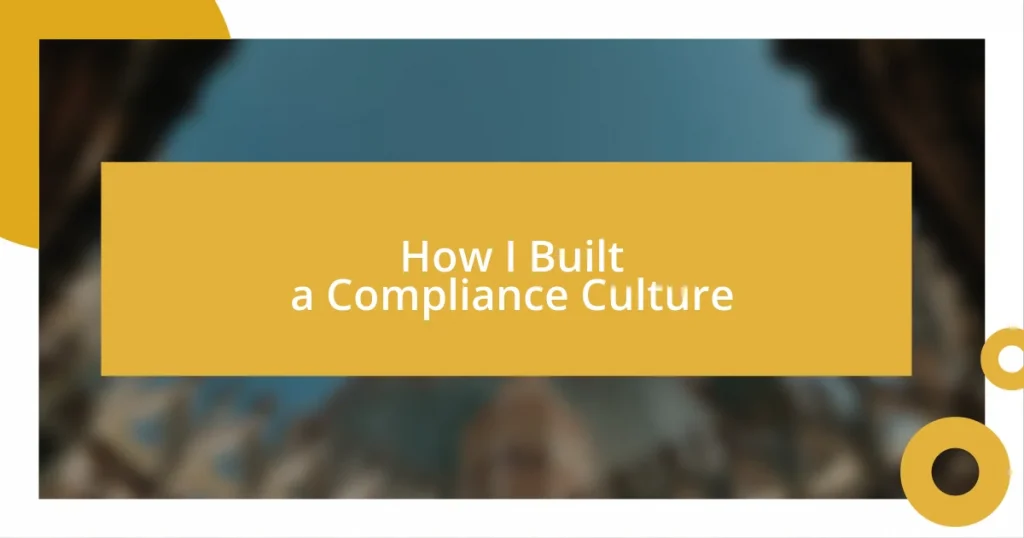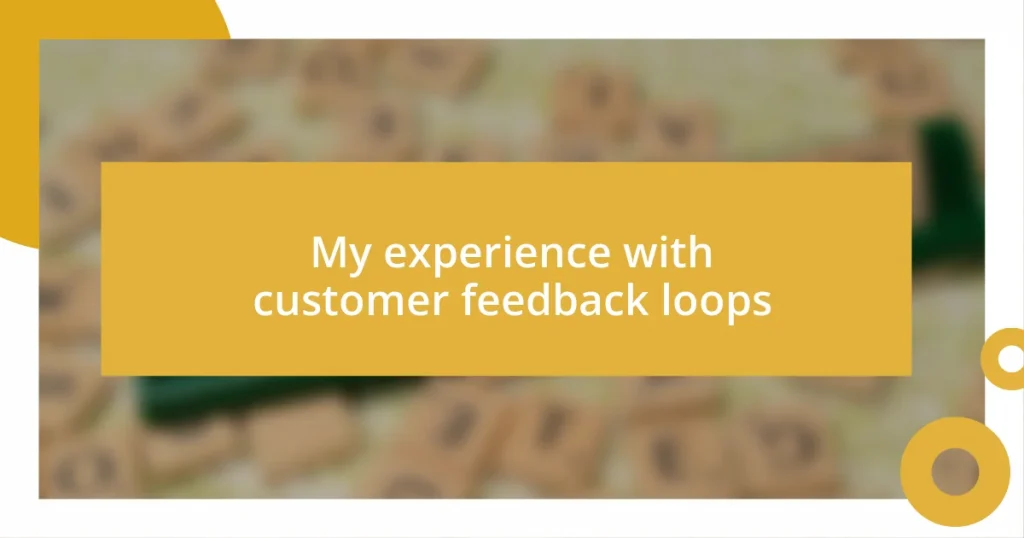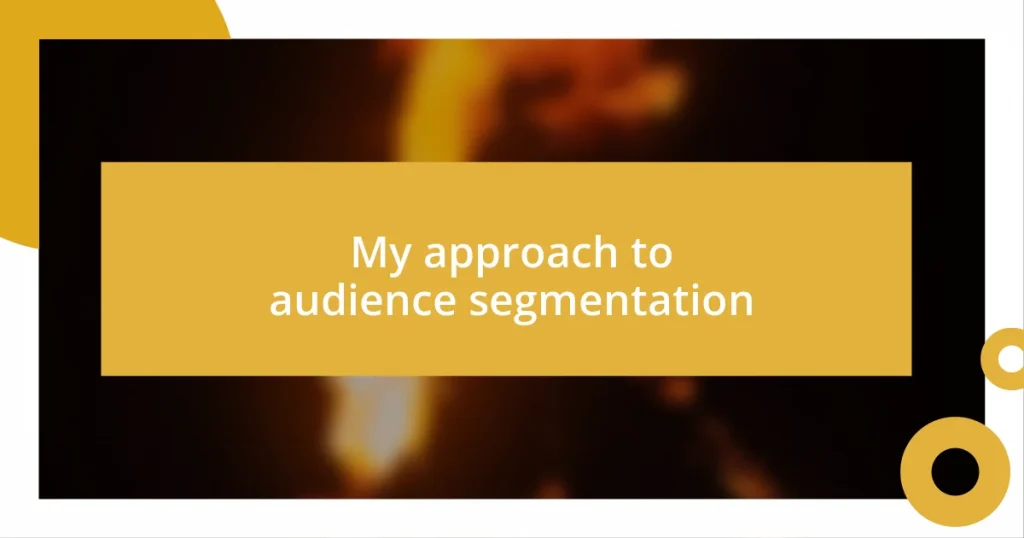Key takeaways:
- Creating a strong compliance culture prioritizes open dialogue, trust, and employee empowerment, ensuring that ethics are embedded in daily practices.
- Engaging employees through interactive training, feedback loops, and recognition fosters a sense of collective responsibility towards compliance.
- Regular measurement of compliance culture through surveys and KPIs, along with transparency in communication about outcomes, helps sustain and strengthen ethical practices over time.
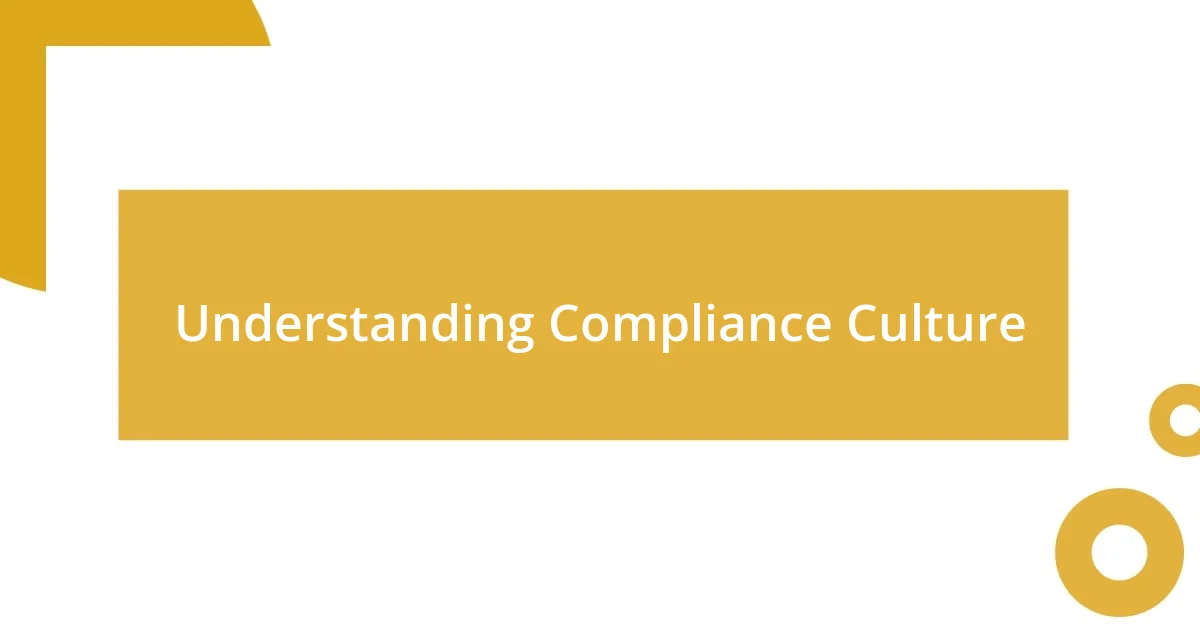
Understanding Compliance Culture
Understanding compliance culture is about more than just adhering to rules; it’s about creating an environment where ethics thrive. I recall a time when a junior team member approached me, unsure about a policy interpretation. Instead of brushing it off, I felt a sense of pride that she felt empowered to seek clarity. That moment underscored the idea that a strong compliance culture fosters open dialogue and trust.
When I think of compliance culture, I often ask myself: what does it truly mean to live by our values day in and day out? It’s not just a set of guidelines; it’s a rhythm that permeates the workplace. For instance, I’ve seen firsthand how regular training sessions can turn compliance from a daunting checklist into a shared practice that everyone embraces. These sessions not only educate but also build rapport among team members, creating a unified front that is invested in doing the right thing.
At its core, compliance culture demands authenticity. I remember a situation where a company faced a significant ethical dilemma. Rather than hiding behind vague statements, leadership openly discussed the challenge, which not only built trust but also encouraged others to voice their concerns. This transparency is vital; it makes employees feel seen and heard, reinforcing the idea that compliance is a collective responsibility, not just the job of a few.
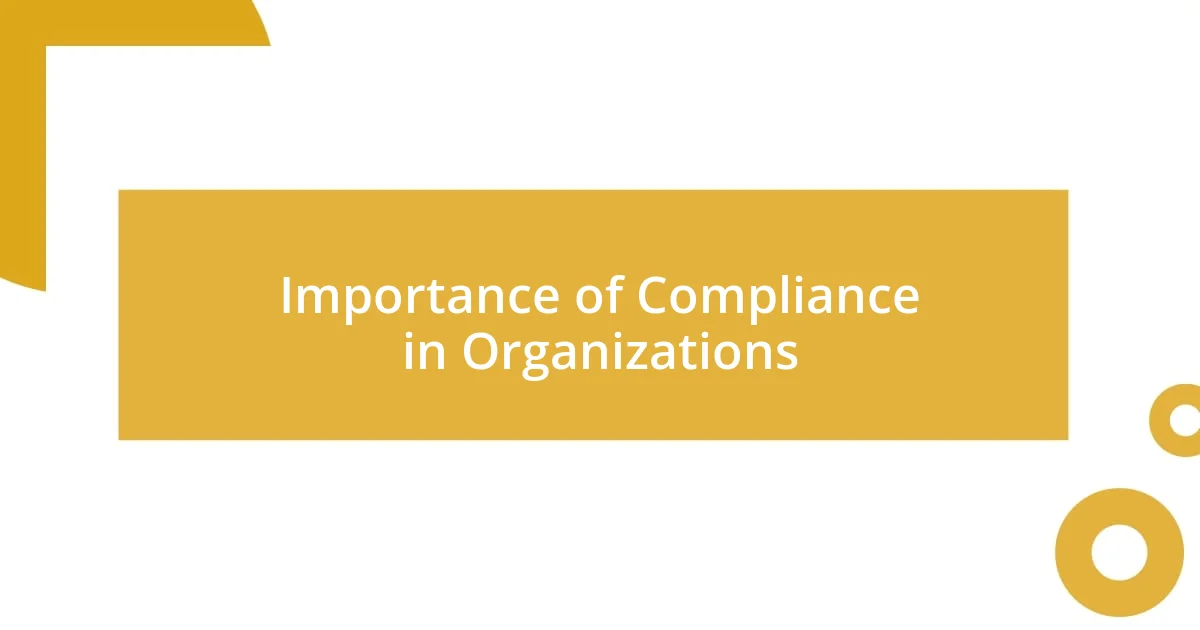
Importance of Compliance in Organizations
A strong compliance culture is crucial for any organization because it serves as the foundation for ethical decision-making. I vividly remember sitting in a meeting where a colleague raised concerns about a potential conflict of interest. The respect given to this concern made everyone realize how imperative it is to safeguard our values. When employees feel empowered to bring up issues, they contribute to an environment that prioritizes integrity over mere compliance.
To me, compliance isn’t just about following regulations; it’s about fostering trust and accountability throughout the organization. I’ve often thought about how companies that truly embrace compliance tend to outperform their competitors. A case in point was when a team I led faced a regulatory audit. Because we had ingrained compliance into our daily activities, we navigated the process smoothly, demonstrating a genuine commitment to upholding our ethical standards.
Moreover, when organizations prioritize compliance, they not only mitigate risks but also enhance their reputation. I can’t help but reflect on times when I’ve seen companies that neglect this aspect suffer severe reputational damage. This makes me grateful for the proactive compliance initiatives in my own workplace. They have become not just policies on paper but vital principles guiding our everyday actions.
| Aspect | Importance |
|---|---|
| Ethical Decision-Making | Fosters a culture of integrity, empowering employees to voice concerns. |
| Trust and Accountability | Creates an environment where compliance is a shared responsibility. |
| Risk Mitigation | Reduces likelihood of regulatory issues and enhances organizational resilience. |
| Enhanced Reputation | A strong compliance culture attracts customers and partners who value ethics. |
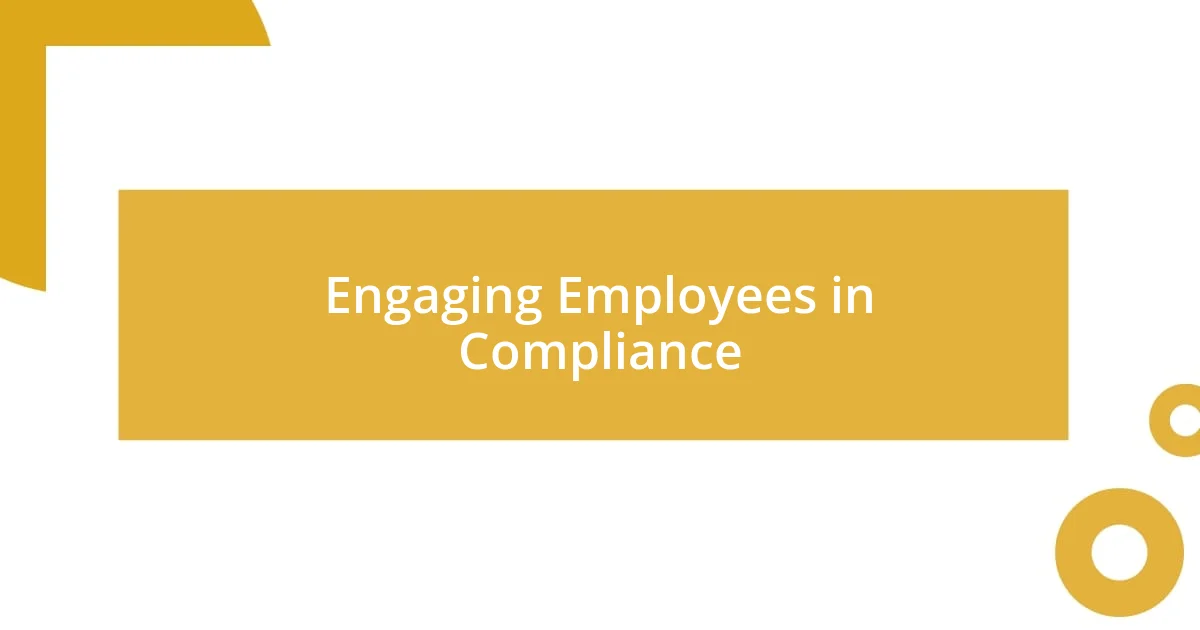
Engaging Employees in Compliance
Engaging employees in compliance isn’t just a box-checking exercise; it’s about creating a culture where every employee feels like they play a role in upholding our values. I’ve witnessed the power of engagement firsthand during our annual compliance week, where employees were encouraged to share their thoughts and experiences. It was enlightening to see how energizing it was for everyone to contribute to discussions, creating an atmosphere of collaboration and shared learning.
To foster this engagement, I’ve found these strategies particularly effective:
- Interactive Training: Replace dry presentations with workshops that invite participation.
- Feedback Loops: Create channels for employees to provide ongoing input about compliance policies.
- Success Stories: Share examples of how compliance positively impacted our operations, making it relatable.
- Recognition Programs: Acknowledge individuals and teams who exemplify compliance in their actions, reinforcing positive behavior.
By using these approaches, I’ve seen genuine enthusiasm bloom among our employees. Their eagerness to be part of the compliance journey reassures me that we’re building something significant together.
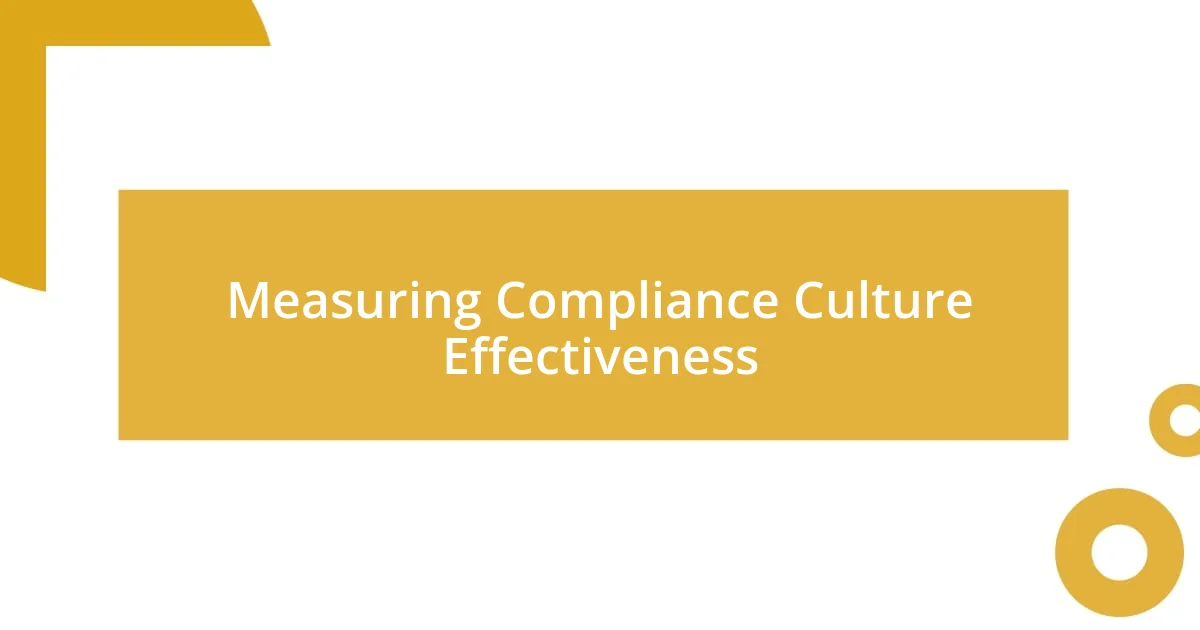
Measuring Compliance Culture Effectiveness
Measuring the effectiveness of a compliance culture can often feel like trying to gauge the temperature of a room without a thermometer. One practical approach I’ve found useful is conducting regular employee surveys that assess their perceptions of compliance and ethics within the organization. When I first implemented this in my team, the insights we gathered led to real changes in our practices and showed just how vital it is to listen to the voices on the ground.
Another method that has proven invaluable is tracking key performance indicators (KPIs) related to compliance activities. I remember when we started measuring not just incidents of non-compliance, but the completion rates of training programs and participation rates in compliance initiatives. The data painted a clearer picture of where we stood and sparked conversations about improving engagement and reinforcing our values. Have you ever paused to consider how metrics could bring clarity to your own compliance efforts? For me, it illuminated the areas where enthusiasm was lacking and provided a roadmap for growth.
Lastly, I can’t stress enough the importance of open dialogue. Encouraging teams to share their experiences creates a feedback loop that allows for ongoing refinement of our compliance practices. I once had a candid conversation with a colleague who revealed how a small change in our reporting process had made it easier for her to voice concerns. This anecdote reinforced for me that measuring culture is not just about numbers; it’s about understanding the human element behind those numbers. How do you think focusing on personal stories could shift your organization’s compliance culture?
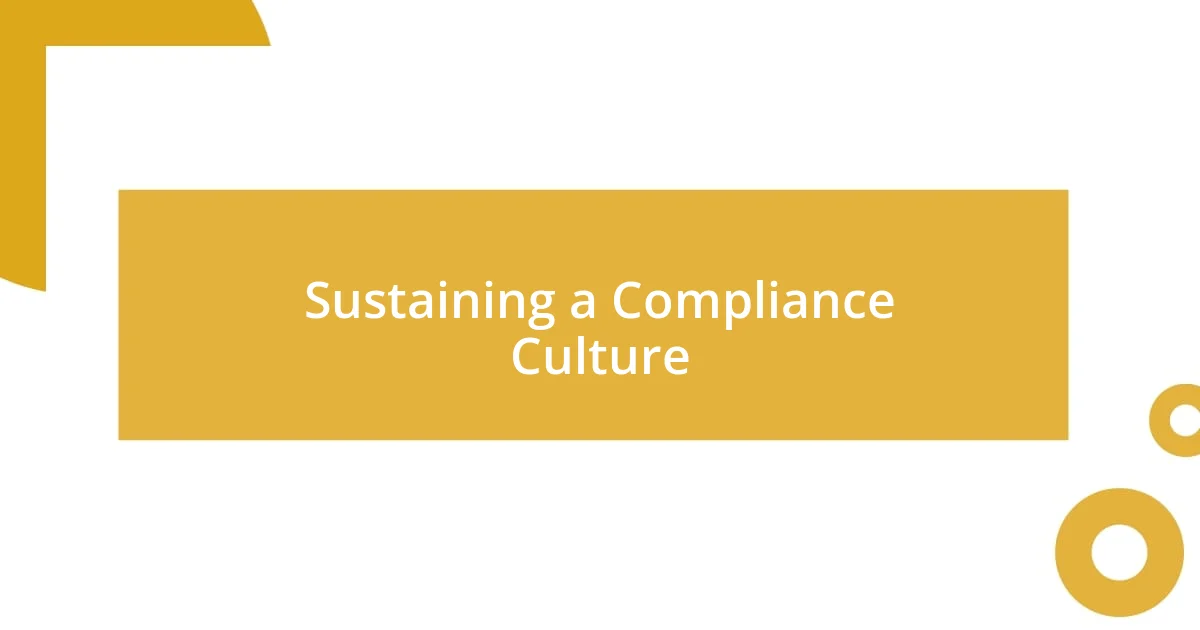
Sustaining a Compliance Culture
Sustaining a compliance culture requires ongoing commitment and creativity. In my experience, regularly revisiting our compliance training has been transformational. I vividly recall conducting quarterly refreshers rather than waiting for annual sessions; it kept compliance at the forefront of everyone’s minds. Have you noticed how quickly information can fade if we don’t engage with it? Repeated exposure has a remarkable way of solidifying understanding and dedication.
Equally critical is sharing real-time updates on compliance outcomes. I once took the initiative to create a monthly “compliance newsletter” that not only highlighted successes but also addressed challenges. The feedback was instant—employees shared how being informed motivated them to stay vigilant. Isn’t it fascinating how transparency can spark a wave of ownership? When people understand the impact of their contributions, their commitment to compliance can deepen, creating a vibrant culture.
Finally, I believe in celebrating small victories along the way. I started a “Compliance Champion” monthly award, recognizing individuals who modeled our compliance principles exceptionally well. It’s incredible how a simple acknowledgment can amplify enthusiasm and encourage others. Do you have ways to celebrate success in your organization? I truly believe these moments reinforce our shared values, ensuring that compliance isn’t just a policy but a collective mission we all share.










